Today we have had a busy day. In the morning we had a zoom visit from Santa. It was lovely to chat with him and ask questions. Thank you, Santa! Then we enjoyed Christmas Lunch together, pulling crackers and sharing jokes.
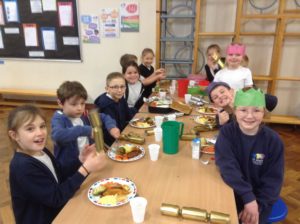
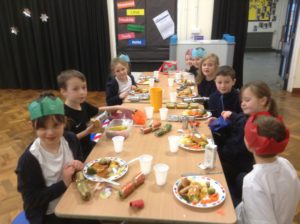
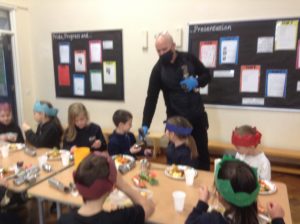
Today we have had a busy day. In the morning we had a zoom visit from Santa. It was lovely to chat with him and ask questions. Thank you, Santa! Then we enjoyed Christmas Lunch together, pulling crackers and sharing jokes.



We were not able to do our usual Christmas performance this year… but we hope you like this instead!
Maths
This week’s maths learning is a review week of what we’ve covered so far this year. You will have completed these lessons (or something similar) at school or home before – that’s OK and is intentional. We think this learning is super important and worth revising.
Year 3 children use these resources:
Year 4 children use these resources:
You don’t have to print the worksheet. Your child can write or draw their answers on paper. Your child’s learning will be most effective if you sit with them to pause the clip and check / praise / support your child as the clip moves on.
Practise times tables on Times Table Rockstars, too. If your child is in Y3, we’re concentrating on the 3 times table. If your child is in Y4, we’re concentrating on the 8 times table. Email the class teacher if you need your child’s login and password details.
(Suggested time: 30 minutes of Maths and 15 minutes of Rockstars daily)
Spelling
Look on the homework page to find this week’s spellings. They should choose some past spellings that they feel less confident with. Your child should complete one task each day.
(Suggested time: 15-20 minutes daily)
Reading fluency
This is the text we’re using in class this week to build up fluency skills.
In school, we generally follow this sequence:
(Suggested time: 15 minutes daily)
Reading comprehension
Day 1: We’ll be using this ‘RIC’ text in class to practise comprehension skills. RIC stands for:
Day 2: Agree with your child three words from any text they’ve read which they’re less familiar with. Your child should find out what they mean (eg by checking an online dictionary or simply discuss with you) and how to use them in sentences (both when speaking and when writing). Challenge your child to write a sentence with each word in, or to drop the words into conversations at home.
Day 3: Read this article from First News, a newspaper for children, and complete the activity.
Day 4: Read your fluency or RIC text again. Next, do one of the following:
Day 5: Book Club. Once a week, we have a relaxing lesson where we sit and read quietly, often with an adult. At home, we’d like you to read your favourite book or text, too. If possible, discuss the book with an adult, talking about some or all of the sections of this sheet.
(Suggested time: 30 minutes daily)
Writing
Follow these lessons on non-chronological reports from Oak National Academy. There’s a whole series of lessons, but start at Lesson 1 and work through, doing one (or maybe even two) each day. (If you’re self-isolating in your second week, stick with the series of lessons you’ve already started and aim to complete the full series.)
(Suggested time: 30-40 minutes for each)
Topic
Our topic this half-term is about history – all about Ancient Greece.
Follow these lessons on pre-historic Britain from Oak National Academy. There are ten lessons in total, but start at the first lesson and work through, doing two or three in the week.
(Suggested time: 30-40 minutes)
Science
Our focus this half-term is sound.
These six lessons from Oak National Academy link closely to what we’ve been doing in class. Start at Lesson 1 and work through, doing two or three in the week. If you’ve previously completed on of these lessons, have a go at the ones you haven’t completed yet.
If Science really motivates your child, you could also use look at these lessons all about practical Science.
(Suggested time: 30-45 minutes)
PE
Don’t forget to do some daily exercise!
Do two or three of these Five Minute Moves from Joe Wicks each day – spread them across the day as if they were playtimes, maybe!
Try working through this series of 25 lessons from the Association for Physical Education – do two or three in the week.
(Suggested time: 5 minutes daily, plus 30 minutes for the longer PE lessons)
Extra stuff…
As an extra (or as an alternative, if this helps to motivate your child)…
Geography isn’t a topic-driver this half-term, but you could brush up on your locational knowledge – something that was missed when schools closed earlier this year. You could explore some online maps and try to memorise some new countries, capitals, rivers and mountain ranges. These three lessons about Europe are worth checking out.
What about some Living and Learning? While you’re away from school, you could check out these lessons on money!
This week, our Living and Learning statement is I can demonstrate different emotions.
As part of this Living and Learning statement, we had a creative homework. It was great to see how the children all tackled this. If ever the children are stuck on their homework, please get in touch with us at Stjamesy3y4@spherefederation.org
Have a look at some of the homework below. We had a great variety of stories, pictures and posters.


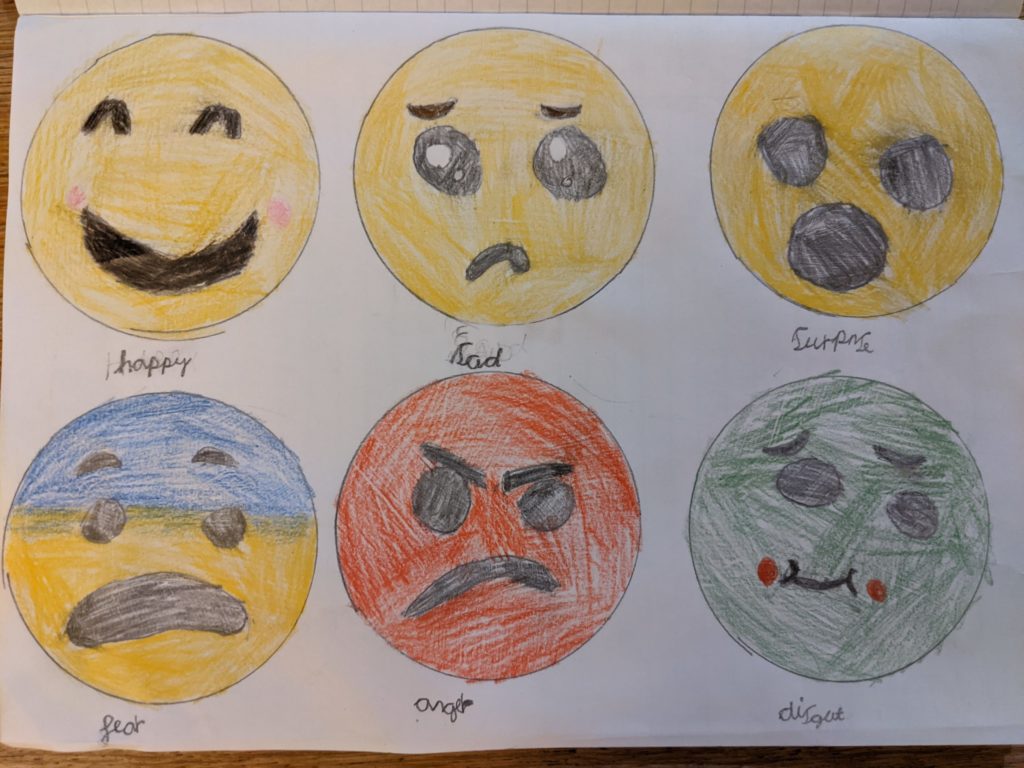
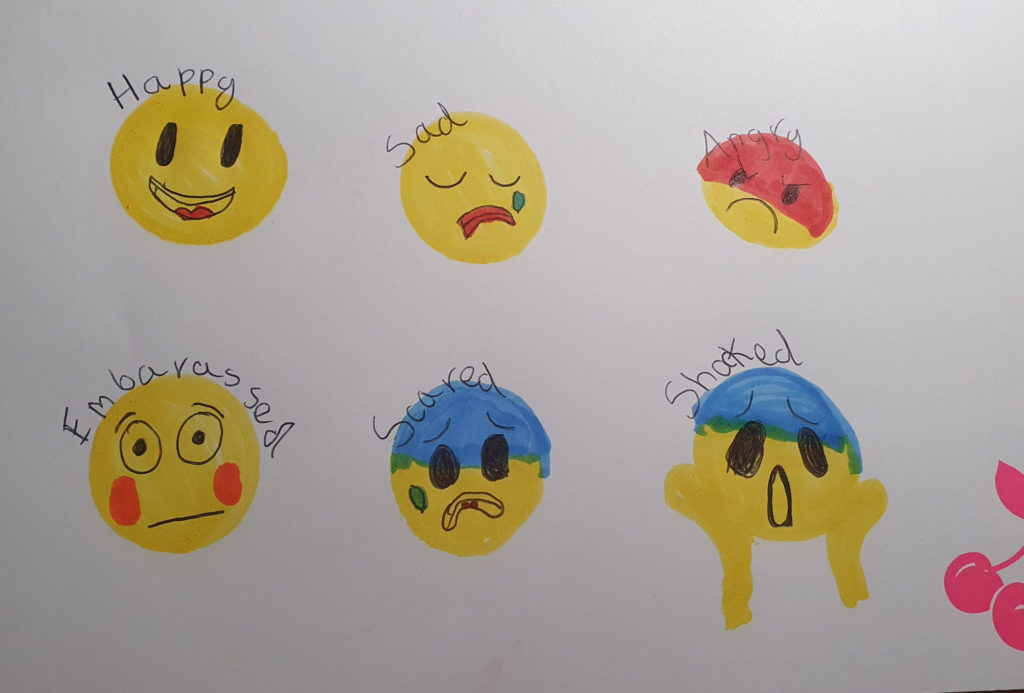
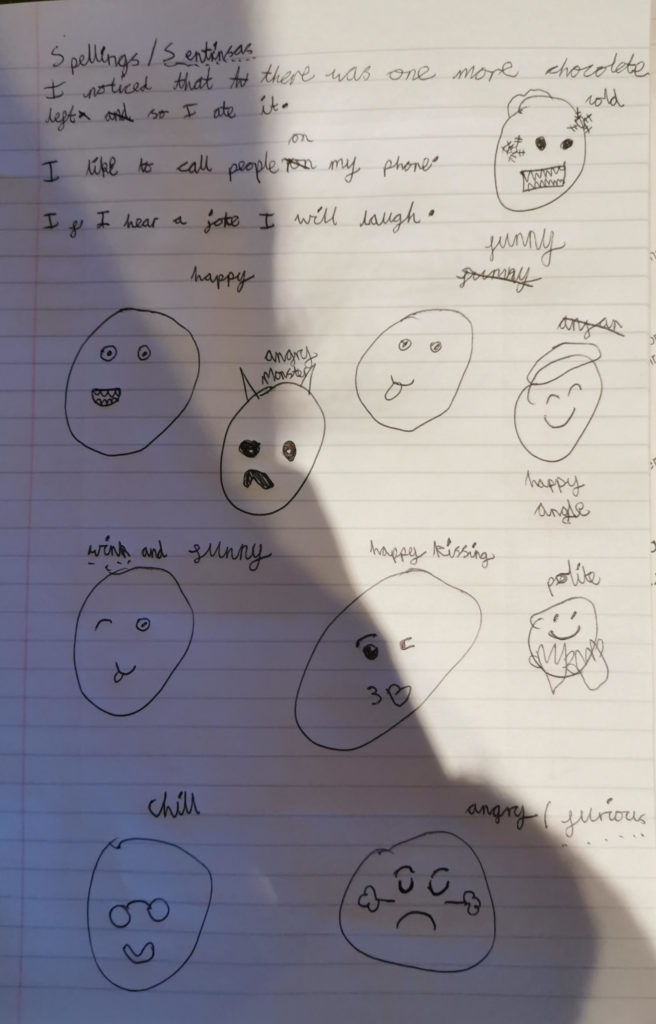

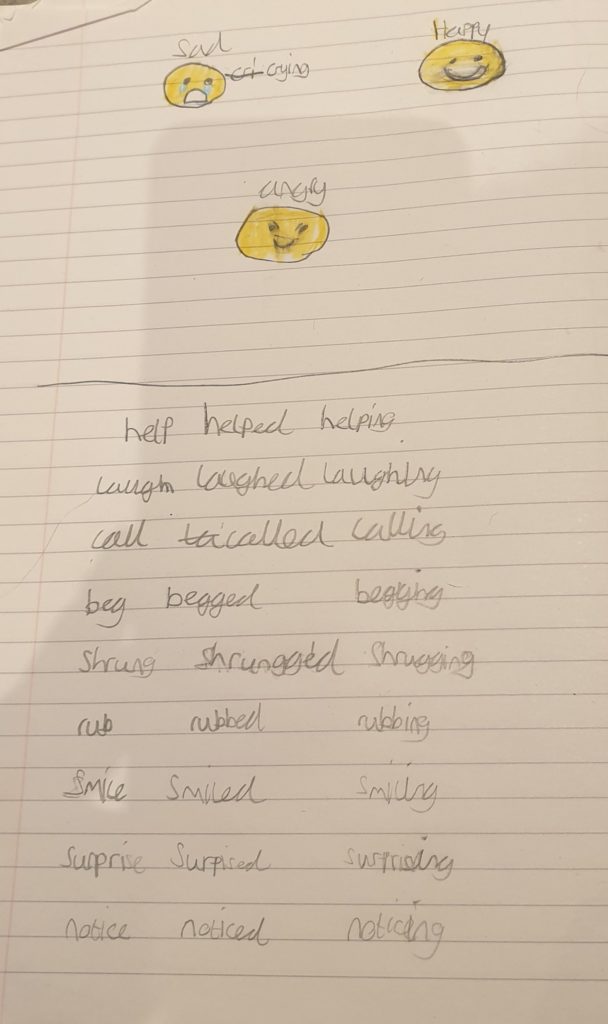


This week, we’ve been practising adding er or est to the end of words to change their tense. Because the English language is really tricky, there’s lots of ways to do this. Complete the table that shows you some different ways to do this (one has been done for you. Then, use some of our ‘super spelling strategies’ form this week’s post (go to the St James’ website, learn more, spelling, Year 3 & 4). There’s more than usual but when you can spell the root word you just need to apply the rule to spell it correctly.
| rule | root word | -er | -est |
| Just add er / est | brave | braver | bravest |
| nice | |||
| later | |||
| Double up and add er / est | hotter | ||
| tall | |||
| smallest | |||
| Drop the y for an i and add er / est | happy | ||
| loneliest | |||
| funny |
Children should practise in preparation for a test on Thursday 17 December 2020.
This week, the whole school has the same Creative homework, which should be returned by Thursday 17 December.
The children are invited to respond to something from either a cultural or a spiritual perspective.
I can present a review of a book / TV show / film or something else cultural.
We’d like children to present their responses about a recent book they’ve read, film they’ve watched, piece of art they’ve looked at, piece of music they’ve listened to – anything cultural in fact.
We’re interested to read some sort of description (a summary, for example) and then your child’s opinions. This review might include pictures, an interview (your child could write a fictional script between himself/herself and the artist, for example), a letter (eg to or from a character, or perhaps even the author) – anything which might include your child’s responses!
However, your child might prefer to do the following:
I know what a faith celebration means to me.
Over the course of this term, some children in school may have celebrated a religious festival of some sort. This might have been
There are lots of other festivals and celebrations, which you and your child together might want to reflect on.
We invite children to respond to the sentence above – they might include a recount (like a diary entry), pictures, an interview (perhaps in a script). Your child might also choose to research a completely unknown festival, or they might even think about creating a brand new festival, one that everyone will celebrate.
Times tables/Number facts:
Complete the attached timetables challenge.
When it comes to times tables, speed and accuracy are important – the more your child practises, the more likely they are to remember the trickier tables facts. Times Table Rock Stars is a fun and challenging programme designed to help children master times tables. Children have already enjoyed practising at school. Now, let’s continue our rock star careers at home…
Children are also able to log onto NumBots (play.numbots.com) using the same login/password. This is a great game to practice their key number facts which is essential to their maths learning.
This is the second weekly message of the week, following an important one yesterday about the end of term…
We’re sorry if the message yesterday confused you. To confirm: next week, we’ll close for the Christmas holidays at the end of the school day on 18 December, as planned, so Friday is a the last day of the school term.
This week, we’ve had the last two parent Zoom sessions – one for Early Years and one for times tables. The feedback from the sessions has been really positive because they’ve been easier to attend than coming into schools. Beyond Covid times, we’ll carry on hosting these sessions by Zoom.
One of the most popular sessions was one on phonics – it was very well attended. We’ve now recorded the sessions:
Links to the two videos are also on our dedicated phonics page.
This week, a primary in north Leeds has had to close for the rest of the term because of positive cases of Covid-19. As a whole, numbers in Leeds are reportedly in decline, which is good news, but please let’s all stay Covid-cautious. It’s thanks to your cooperation that Sphere Federation schools have been relatively unaffected by the pandemic so far.
The rest of this week’s message has various items…
Asda supermarket cafes are providing children under the age of 16 with a meal completely free of charge via a takeaway service. There are no minimum spend requirements or restrictions on the number of children in a family or group that can take advantage of this offer. The offer runs until 31 December (except when stores are closed).
TikTok’s terms and conditions state that the app should only be used by people 13years old and over. Despite this, it’s sometimes used by children younger than 13. There’s a new feature that you should know about. Family Pairing allows parents and carers to guide their child’s TikTok experience in a safer way. Features include:
Staffed by experienced counsellors, the West Yorkshire and Harrogate Grief and Loss Support Service is for anyone who is experiencing loss of any kind and the grief and emotional distress that loss may cause. Available to everyone living in West Yorkshire, the service is a free telephone counselling support service that operates 8am-8pm, 7 days a week. It includes text and live online chat facilities as well as translation options. Call the service on 0808 196 3833, or use text or online live chat at griefandlosswyh.co.uk.
Ollee is a digital friend for children aged 8-11, created by Parent Zone and funded by BBC Children in Need’s A Million & Me initiative, which aims to make a difference to children’s emotional wellbeing. Ollee is designed to help children reflect on how they feel and to process their experiences with the support and help of their parents and carers – and it does this by offering them advice about a range of subjects: school, family, friends, their body, the internet and the world.
For each of these subjects, children can choose an emotion that matches how they feel about it: happy, angry, sad, confused, frustrated, stressed or worried. Next, they can choose from a list of topics – for instance, a child who was worried about school might be able to select ‘I haven’t done my homework’ as the cause of their worry. Finally, they’ll see a page of advice about the topic, presented in child-friendly, bite-sized chunks they can read then or save for later.
Have a happy and healthy and safe weekend, whatever you get up to.
This is the first of two whole-school messages this week. This one confirms that we will close at the end of the school day on Friday 18 December, as planned…
On Tuesday, with eight days of term remaining, the government sent schools an email with two main sections:
St James’ CE Primary will stick to our original plan of being open on Friday 18 December. We’ve based this decision on two main reasons:
In its email to schools on Tuesday, the Department for Education state ‘We recognise this communication has arrived with schools late in the term…’. An email today from the NAHT (National Association of Head Teachers) states ‘NAHT has been raising our serious concerns about this issue with the DfE for a number of months’.
The government’s decision that schools may close a day early next week follows a number of schools who have tried to exercise some flexibility to alleviate some of the pressure at the end of term, the most publicised being the from Focus Trust.
So… for the first week of the holiday, up to and including Thursday 24 December, our Heads of School are available. This is in case you need to tell school about a positive case and/or they need to advise close contacts to self-isolate. This will be done by text or email, not a phone call.
After Thursday, where pupils are required to self-isolate due to contact with a positive case, you don’t need to inform us about absences until the first day of the new term (Tuesday 05 January).
Thank you to Miss Beatson for committing to this additional responsibility, and to admin staff for agreeing to be available to support.
We have had great fun today in Class Continue reading “Greek vases”
Maths
This week’s maths learning is linked to measurement and addition and subtraction.
Year 3 children use these resources:
Year 4 children use these resources:
You don’t have to print the worksheet. Your child can write or draw their answers on paper. Your child’s learning will be most effective if you sit with them to pause the clip and check / praise / support your child as the clip moves on.
Practise times tables on Times Table Rockstars, too. If your child is in Y3, we’re concentrating on the 3 times table. If your child is in Y4, we’re concentrating on the 8 times table. Email the class teacher if you need your child’s login and password details.
(Suggested time: 30 minutes of Maths and 15 minutes of Rockstars daily)
Spelling
Look on the homework page to find this week’s spellings. They should choose some past spellings that they feel less confident with. Your child should complete one task each day.
(Suggested time: 15-20 minutes daily)
Reading fluency
This is the text we’re using in class this week to build up fluency skills.
In school, we generally follow this sequence:
(Suggested time: 15 minutes daily)
Reading comprehension
Day 1: We’ll be using this ‘RIC’ text in class to practise comprehension skills. RIC stands for:
Day 2: Agree with your child three words from any text they’ve read which they’re less familiar with. Your child should find out what they mean (eg by checking an online dictionary or simply discuss with you) and how to use them in sentences (both when speaking and when writing). Challenge your child to write a sentence with each word in, or to drop the words into conversations at home.
Day 3: Read this article from First News, a newspaper for children, and complete the activity.
Day 4: Read your fluency or RIC text again. Next, do one of the following:
Day 5: Book Club. Once a week, we have a relaxing lesson where we sit and read quietly, often with an adult. At home, we’d like you to read your favourite book or text, too. If possible, discuss the book with an adult, talking about some or all of the sections of this sheet.
(Suggested time: 30 minutes daily)
Writing
Follow these lessons on non-chronological reports from Oak National Academy. There’s a whole series of lessons, but start at Lesson 1 and work through, doing one (or maybe even two) each day. (If you’re self-isolating in your second week, stick with the series of lessons you’ve already started and aim to complete the full series.)
(Suggested time: 30-40 minutes for each)
Topic
Our topic this half-term is about history – all about Ancient Greece.
Follow these lessons on pre-historic Britain from Oak National Academy. There are ten lessons in total, but start at the first lesson and work through, doing two or three in the week.
(Suggested time: 30-40 minutes)
Science
Our focus this half-term is sound.
These six lessons from Oak National Academy link closely to what we’ve been doing in class. Start at Lesson 1 and work through, doing two or three in the week. If you’ve previously completed on of these lessons, have a go at the ones you haven’t completed yet.
If Science really motivates your child, you could also use look at these lessons all about practical Science.
(Suggested time: 30-45 minutes)
PE
Don’t forget to do some daily exercise!
Do two or three of these Five Minute Moves from Joe Wicks each day – spread them across the day as if they were playtimes, maybe!
Try working through this series of 25 lessons from the Association for Physical Education – do two or three in the week.
(Suggested time: 5 minutes daily, plus 30 minutes for the longer PE lessons)
Extra stuff…
As an extra (or as an alternative, if this helps to motivate your child)…
Geography isn’t a topic-driver this half-term, but you could brush up on your locational knowledge – something that was missed when schools closed earlier this year. You could explore some online maps and try to memorise some new countries, capitals, rivers and mountain ranges. These three lessons about Europe are worth checking out.
What about some Living and Learning? While you’re away from school, you could check out these lessons on money!